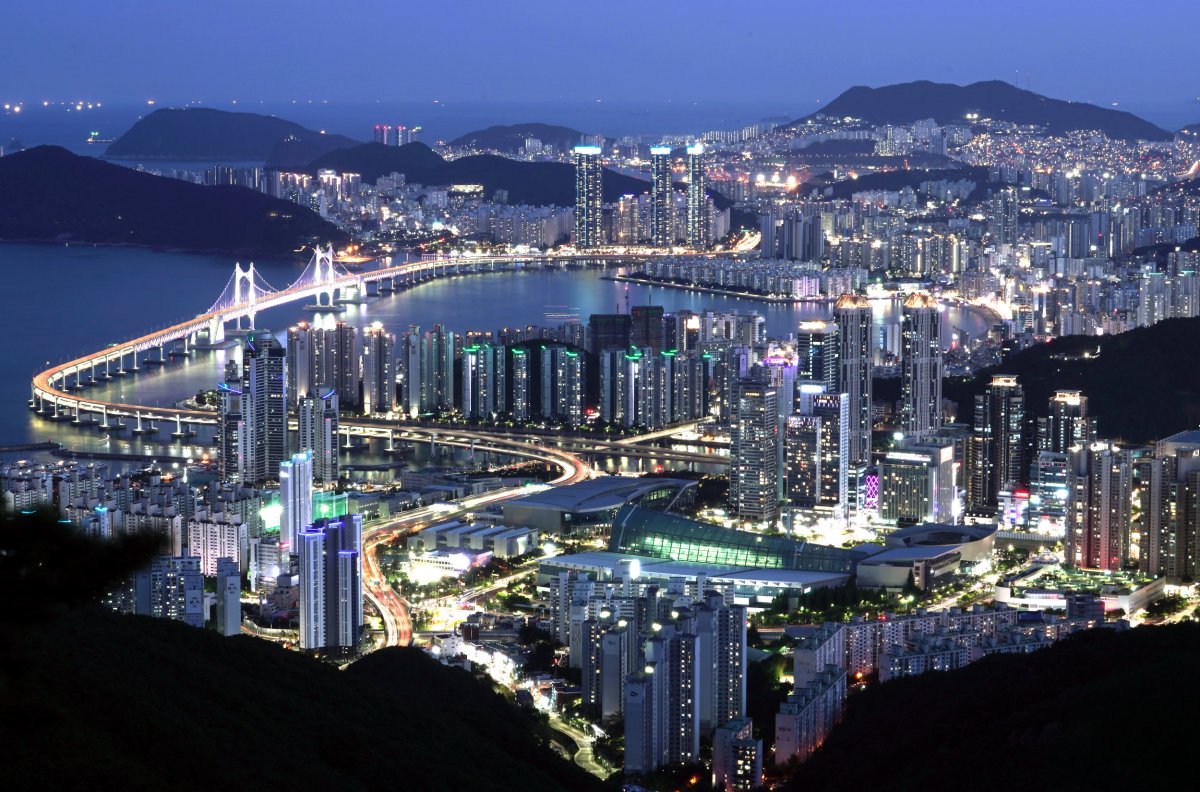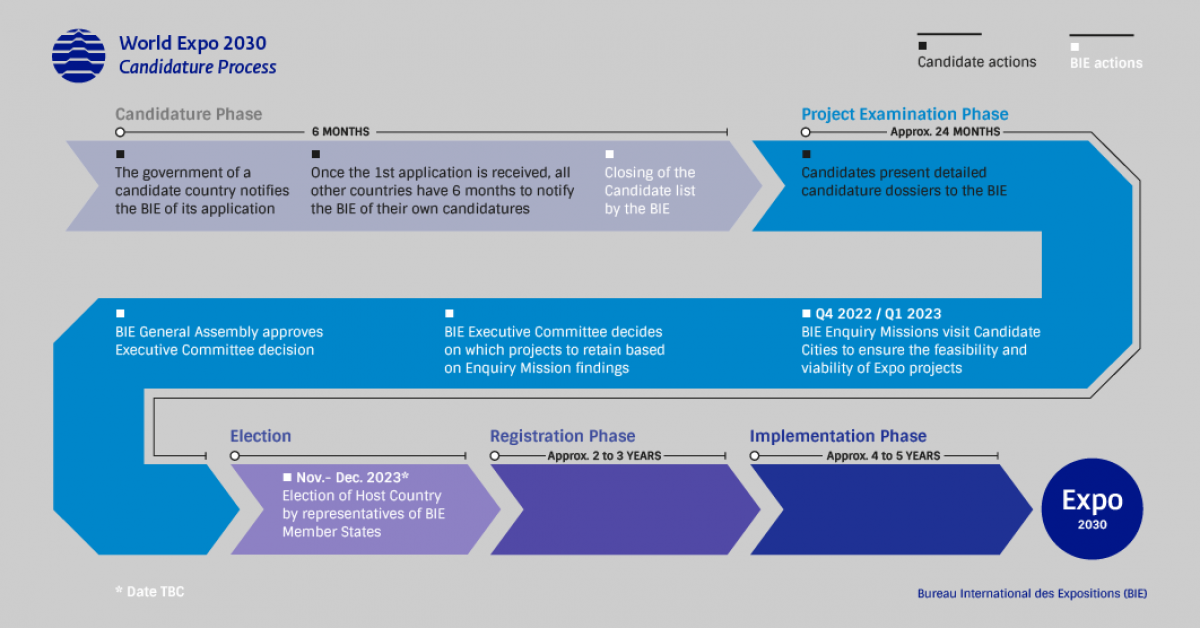Seventy years ago, the small port city of Busan served as a refuge for at millions of Koreans fleeing war on a newly divided peninsula. The North Korean offensive that began in 1950 rolled through nearly all of South Korea, sparing only its southeasternmost stretch, where Busan is located.
What was once a safe haven has since flourished into South Korea's second-most-populated city after the capital Seoul, and the port that once shipped in vital wartime supplies now counts itself as one of the busiest in the world for international commerce, coming in at seventh-busiest in terms of overall container traffic and second when it comes to transshipment.
Now, riding on the crest of a "K-Wave" that has seen Korean music, film and television take root across the globe like never before, Busan is in the throes of further transformation as it looks to host the World Expo in 2030.
"We were once one of the poorest countries and became the 10th-most-advanced country [in terms of GDP]," Busan Director-General of Tourism and MICE [Meetings, Incentives, Conferences and Exhibitions] Cho You-jang told Newsweek.
"Busan embraces the unique history of Korea," he added. "You can see Korea's history of growth throughout Busan, so it presents itself as an ideal city of Korea's modern history."
This unique experience, Cho said, also offered a "unique appeal to both the least-developed countries as well as developing countries, so we can serve as a bridge and we can share our experiences."

The World Expo, sometimes known as the "World's Fair," has its roots in the 1791 exposition held in Bohemia-era Prague. The first official World Expo was held six decades later in London. Since then, cities around the world have held expositions inviting international guests, with the process first becoming formalized in 1928 under the Paris-based Bureau International des Expositions (BIE), now comprised of 170 member states and whose president happens to be Korean diplomat Choi Jai-chul.
Such events are today divided into World Expos, which are held every five years, and Specialized Expos, which are held in between. South Korea has previously hosted two Specialized Expos in the cities of Daejon and Yeosu in 1993 and 2012, respectively, but has never held a World Expo.
The World Expo is considered a mega-event, comparable to the Olympic Games and the World Cup, making the candidate process extremely competitive. The last World Expo was held in Dubai in 2021, delayed one year due to the COVID-19 pandemic, and the next will be held in Osaka, Japan, in 2025.
In seeking to take the 2030 spot when the winner is announced late next year, Busan has faced a formidable array of competitors.
The remaining rivals are Rome, Italy, a leading tourist destination country that held the 2015 World Expo in Milan, and Riyadh, Saudi Arabia, an influential contender that already appears to have won dozens of backers in the midst of a national branding campaign aligning with Crown Prince Mohammed bin Salman's Vision 2030. Two other candidates, Odesa, Ukraine, and Moscow, Russia, are at war with one another, resulting in the former being disqualified and the latter voluntarily withdrawing its candidacy.
Newsweek reached out to representatives of Rome's and Riyadh's candidacy for the World Expo 2030 for comment.
Busan's bid has focused on three main themes, which Cho explained as being the response to climate change, technological innovation and development for humanity and, finally, sharing and caring for the community.
The city has already emerged as a center for sustainable development projects such as Oceanix, billed as the world's first floating city, as well as a rapidly growing technology hub showcased by projects such as the "smart port" initiative to introduce unmanned platforms to the city's maritime and logistics sector.
From a cultural perspective, the city has hosted the Busan International Film Festival since 1996 and could be called home by two members of the world-famous boy band BTS, which is set to soon be appointed ambassadors for the World Expo 2030 bid.
The group's agency announced Thursday that BTS would hold a concert in October to promote Busan's candidacy.
Capitalizing on these efforts, Cho said Busan hoped to market itself as a "global hub," including a comprehensive makeover of the old port that opened in 1876.
But these projects come at a cost, some $4 billion that the city is looking to invest as part of the waterfront redevelopment in time for the World Expo in 2030. The money would come from the central government in Seoul, where President Yoon Suk-yeol has endorsed the plan and vowed his full support for it.

Still on the table is the proposed construction of a new international airport that officials hope would accommodate their ambitious vision of the city's near future. In many ways, however, Busan has remained in the shadow of Seoul, something Choe said he hoped the World Expo 2030 bid could change.
"Every developed country has got two or three international metropolitan cities," Choe said. "Busan is basically the second city of Korea, but it is not promoted on the world stage. So we are working to improve our global prestige and our recognition as a global city, and that is why we are contending for the World Expo."
And Choe said the geopolitical realities that continue to haunt the Korean peninsula could serve as an example to nations still struggling to develop, rather than serve as an obstacle.
"Korea is still a divided country, we still have got tensions on the Korean peninsula," Cho said. "However, through our World Expo, we can mobilize a peaceful environment and atmosphere and that is why Korea is in a very unique position."
Other officials in South Korea have echoed this view as part of the country's broader goal of positioning itself as a "Global Pivotal State," a term at the center of Yoon's strategy to promote his country's journey to prosperity.
"Korea is probably the only country in the world that succeeded in rebuilding the country from ruins and at the same time achieving full-fledged democracy," one South Korean official told Newsweek on the condition of anonymity. "Thus, we would like to be a living testament to other developing countries to show that, yes, economic development and democratization can be achieved.
"When developing countries see Korea," the official added, "we hope they see their future."
Uncommon Knowledge
Newsweek is committed to challenging conventional wisdom and finding connections in the search for common ground.
Newsweek is committed to challenging conventional wisdom and finding connections in the search for common ground.
About the writer
Based in his hometown of Staten Island, New York City, Tom O'Connor is an award-winning Senior Writer of Foreign Policy ... Read more
To read how Newsweek uses AI as a newsroom tool, Click here.








